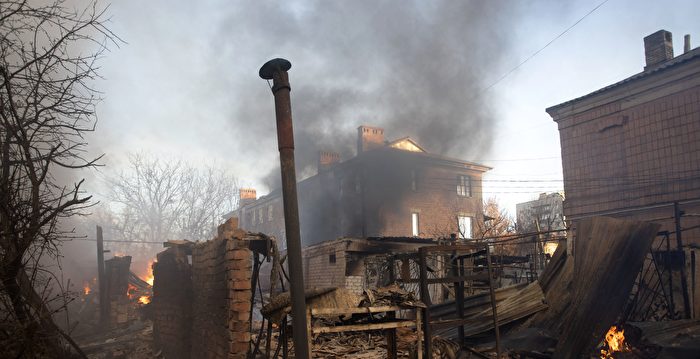[The Epoch Times, December 5, 2022](Comprehensive report by Epoch Times reporter Li Yan) The Group of Seven (G7) cap on the price of Russian seaborne oil will take effect on Monday (December 5). Ukraine said Russia launched a new round of missile attacks on the same day. The West is trying to limit Moscow’s ability to prop up its war in Ukraine through price caps. But Russia said it would not abide by the measure even if it had to cut production.
Aerial sirens sounded across Ukraine on Monday amid a new wave of missile attacks on the country since Russia invaded on Feb. 24. Ukrainian officials urged civilians to seek asylum.
“Don’t ignore the alarm,” said Andriy Yermak, Ukraine’s chief of staff for the presidency.
“The missiles have been launched,” Ukrainian air force spokesman Yuriy Ihnat said. There was no immediate word of any damage or casualties. But Ukrainian media quoted officials as saying that overhead explosions could be heard in some areas as the aid defense system went into action.
In recent weeks, Russian forces have increasingly targeted Ukrainian energy facilities as they face further setbacks on the battlefield, Reuters reported. As winter approaches, it causes severe power outages in Ukraine.
Russia said the attacks were aimed at weakening Ukraine’s military. Ukraine said the attacks clearly targeted civilians and therefore constituted war crimes.
The G7 price cap of $60 a barrel for seaborne Russian crude came into effect on Monday. The price cap was approved by the G7 and Australia on Friday (Dec. 2) after EU member Poland dropped its opposition. Poland wants a lower price ceiling. Russia is the world‘s second largest oil exporter.
The deal allows Russian oil to be shipped to third countries using G7 and EU tankers, insurers and credit institutions, but only if it is traded at or below that ceiling price.
Moscow said it would not abide by the measure even if it had to cut production, while Ukrainian President Volodymyr Zelenskiy said $60 was too high to deter a Russian attack.
“You wouldn’t say it was a serious decision, setting such a limit on Russian prices, which is quite comfortable on the budget of a terrorist state,” Zelensky said.
Russian Deputy Prime Minister Alexander Novak called it a gross intervention that violated free trade rules and would further destabilize markets.
“We will only sell oil and oil products to countries that cooperate with us under market conditions, even if we have to Reduce production a little.”
The oil price cap came into force as both Russia and Ukraine reported casualties in attacks on an industrial enterprise and another site in southern Ukraine, as well as state-run accommodation complexes on Russian-held territory in the east.
Three dormitories at the Donbass State College in the region were hit by Ukrainian fire early Monday, killing nine people, the Russian-appointed governor of the eastern Luhansk region and Russia’s state-run news agency TASS said.
The pro-Russian governor Leonid Pasechnik said the dormitories were being used to house refugees and construction workers.
In Kryvyi Rih, one of southern Ukraine’s largest cities, Russian rockets killed 12 people just after midnight, Dnipropetrovsk region governor Valentyn Reznichenko said. One died and three were injured.
“They targeted an industrial company,” Reznichenko said on the Telegram messaging app, without giving details.
Russian shelling killed two people in the past 24 hours, Ukrainian Governor Yaroslav Yanushevych said, as Russian troops were forced to withdraw to the southern Kherson region across the Dnieper River.
In Russia, three people were killed and six others were injured when a fuel tanker exploded at a Russian airport near the city of Ryazan, southeast of Moscow, on Monday, RIA Novosti reported, without giving a reason.
The Epoch Times could not independently verify the reports.
Zelensky said Ukrainian forces were holding positions along the front, including in the east near Bakhmut, which is seen as the next target for Russia’s advance in the Donetsk region.
About 16 settlements, including Bakhmut and nearby Avdiivka, were hit by tanks, mortars, gun barrels and rocket fire, the General Staff of Ukraine’s armed forces said.
The Russian Ministry of Defense said its troops successfully conducted operations around Bakhmut and repelled a Ukrainian attack on the city of Donetsk. Russian officials said Ukraine had fired at least 10 Grad rockets there. There was no word on casualties.
Fighting in Ukraine is still going on, but at a “slower pace” as both sides prepare for a post-winter military push, the head of the U.S. intelligence community said Saturday.
The United States and its allies have imposed sweeping sanctions on Russia and provided billions of dollars in military aid to Ukraine since Russia’s Feb. 24 invasion.
However, French President Emmanuel Macron drew criticism from Ukraine and his Baltic allies over the weekend. The reason was his suggestion that the West should consider Russia’s need for security guarantees if Russia agreed to a negotiated end to the war.
Zelensky aide Mykhailo Podolyak said the world needed Russian security guarantees, not the other way around.
German Chancellor Olaf Scholz warned on Monday against creating a new cold war by dividing the world into different blocs. It was a further sign of Western unease about the standoff that has created an energy and refugee crisis in Europe.
Editor in charge: Li Huanyu #
